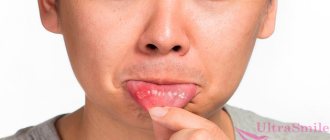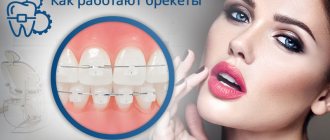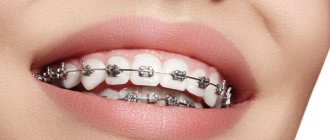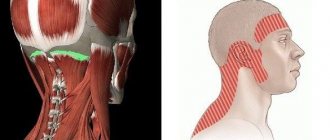May 15, 2020
If the lower or upper jaw becomes numb, this may be a natural reaction of the body, for example, to medical intervention, or it may indicate various problems that require immediate medical attention. In today's article by the editors of the UltraSmile.ru portal, we propose to analyze in detail the main reasons why numbness and discomfort occurs in the lower part of the face.
There can be several reasons for jaw numbness
Inflammatory process on the root of the tooth
If you are wondering why the lower jaw is numb, then the first thing you need to pay attention to is the condition of the oral cavity. An unpleasant symptom can be caused by dental diseases such as periodontitis and a cyst on the root of the tooth. Then, in addition to discomfort, a slight tingling sensation may be observed in the jaw and chin area, as well as pain when pressing or chewing food on the causative tooth.
The photo shows a cyst
Causes of lower lip twitching and additional symptoms
The lower lip can twitch constantly, or only in moments of strong emotional excitement. Tremor of this part of the face occurs under the influence of physiological or pathological reasons. In the latter case, we are talking about diseases of the body that disrupt the innervation of muscle tissue in the lower lip area. Physiological factors are considered less dangerous because they disappear on their own without the use of medications.
Brain tumors
Foreign neoplasms in the structure of the brain can cause disruption of the innervation of the facial muscles, which leads to a reflex twitching of the lower lip. Similar symptoms are caused by benign and oncological tumors of various types.
In this case, the patient has the following additional symptoms:
- dizziness;
- periodic loss of consciousness;
- nausea;
- darkening of the eyes;
- decreased visual acuity;
- attacks of severe headache;
- memory impairment;
- poor coordination of movements;
- spasms of the lower extremities;
- epilepsy attacks.
As the foreign tumor increases in size, the frequency of involuntary twitching of the lower lip increases. The risk of paresis of individual segments of the facial muscles, as well as disruption of the innervation of other parts of the body, increases.
Atherosclerosis
The lower lip twitches (the causes of tremor are determined by a neurologist) in patients with focal lesions of the central nervous system. The development of cerebral atherosclerosis leads to gradual damage to its tissues. The areas of the central nervous system responsible for the synchronous functioning of the facial muscles cease to perform their functions, as they do not receive adequate blood supply.
Twitching of the lower lip, provoked by cerebral atherosclerosis, is accompanied by the following additional symptoms:
- headache;
- absentmindedness;
- asthenia;
- memory impairment, when the patient remembers all the events of past years, but is not able to remember new amounts of information;
- noise in ears;
- insomnia at night and sleepiness during the day;
- dizziness;
- sudden mood swings;
- increased tendency to depression;
- change in speech diction;
- unsteadiness of gait;
- facial asymmetry.
The main danger of cerebral atherosclerosis is that its manifestation begins with periodic twitching of the lip and ends with partial paralysis of the body and loss of cognitive functions. A person is deprived of basic skills for independently servicing household needs.
Leptospirosis
Leptospirosis is an acute bacterial disease caused by a pathogenic microorganism of the genus Leptospira. The anicteric form of this disease is manifested by inflammatory damage to internal organs, as well as the lining of the brain.
An infected person may experience involuntary twitching of the lower lip, which is accompanied by the following additional symptoms:
- high body temperature, which is kept within 38-39 degrees;
- physical weakness and fatigue;
- dizziness;
- increased liver volume;
- impaired coordination of movements;
- hypertonicity of skeletal muscles, when the patient is unable to straighten his leg at the knee, or independently turn his neck to the side;
- attacks of severe headache;
- increased irritability of the nervous system in response to bright lights or loud sounds;
- hypersensitivity of the skin;
- oliguria.
Leptospirosis is dangerous because it can cause a reflex twitching of the lower lip, which ends in partial paresis or irreversible paralysis of the facial muscles. The causative agents of this disease enter the human body through damaged areas of the skin.
Consequences of brain injuries
Previous traumatic brain injury is one of the most common causes of involuntary twitching of the lower lip. Blows to the head, falls from great heights, and car accidents cause local hemorrhages in the structure of the central nervous system. Violation of the stable functioning of certain parts of the brain leads to pathological innervation of the facial muscles in the lower lip area.
The impact of this causative factor may be accompanied by the following additional symptoms:
- periodic loss of consciousness;
- dizziness;
- nausea;
- impaired coordination of movements;
- spasms of the lower extremities;
- epileptic seizures;
- impairment of vision or hearing;
- headache;
- speech disorders;
- increased intracranial pressure.
The frequency of involuntary twitching of the lower lip depends on the severity of the previous traumatic brain injury. Taking antiepileptic, nootropic drugs, and vitamin therapy improve the functions of damaged areas of the central nervous system.
Stressful situations
The lower lip twitches (the causes of spasm of the facial muscles are increased excitement of the peripheral nerves) in men and women who live daily under conditions of chronic stress. Psycho-emotional stress leads to neurological disorders that can cause rhythmic twitching of this part of the face.
The harmful effects of stress cause the following additional signs of a painful state of the body:
- increased irritability;
- fast fatiguability;
- loss of appetite;
- insomnia;
- absent-mindedness;
- inattention;
- sudden mood swings;
- depression;
- apathy;
- tearfulness;
- sudden attacks of anger, rage;
- headache.
When the next stressful situation occurs, the pathological symptoms worsen in terms of reflex twitching of the lower lip. In this case, the person does not feel or notice that he has a facial tic.
Facial neuritis
Inflammation of the peripheral nerves responsible for the mobility of the facial muscles can lead to involuntary twitching of the lower lip. The occurrence of this causative factor is due to hypothermia of the body, prolonged exposure to drafts, infection with infectious microorganisms that damage nerve endings.
Facial neuritis
Neuritis of the facial nerve, which caused a tic of the lower lip, is characterized by the following symptoms:
- pain in the area of the right or left ear;
- active salivation;
- loss of taste;
- hearing loss;
- facial asymmetry, which increases during conversation;
- smoothing the skin in the nasolabial fold area;
- drooping of one corner of the mouth;
- an attempt to bare teeth results in the mouth being pulled towards healthy facial nerves.
In the presence of this disease, a person feels an uncontrollable twitching of the lower lip, and also experiences difficulties with facial expressions. For example, he cannot close his eyes completely, wrinkle his forehead or smile.
Surgical intervention
Some patients report that their upper or lower jaw goes numb after undergoing the following dental procedures:
- tooth extraction: most often, an unpleasant symptom occurs after a complex removal of third molars, accompanied by drilling of the roots, peeling of the soft gum tissue and suturing,
- vestibuloplasty,
- trimming the frenulum of the tongue,
- bone tissue augmentation surgery: sinus lift and bone grafting,
- implantation1: especially when a large number of teeth were restored at once,
- opening and removal of cysts, granulomas, abscesses.
This condition can occur after surgery.
Why does the jaw go numb in the above cases? This may be a normal reaction of the body to nervous and physical stress, surgery, tissue injury and capillary damage. Most often, the symptom is associated with compression (squeezing) of nerve endings due to the formation of physiological edema that occurs after surgical procedures. Normally, the numbness should go away within a week after the intervention, but if it persists longer, it may indicate other problems. Read on!
Content:
- Causes of numbness
- Typical clinical picture
- Other symptoms
- Treatment
Alcohol in excessive quantities has a negative effect on all organs. The nervous system is also very sensitive to its effects - central (CNS), as well as peripheral. One of the consequences of this effect on the nerve structures is numbness after heavy drinking, which is felt in the hands.
At first it is insignificant, then it progresses - it causes discomfort and interferes with performing various types of work with your hands.
There is another side to the “coin”: such a feeling is not only unpleasant in itself, but can signal the possible development of a stroke.
Medical errors made during dental treatment
Dental treatment, and especially procedures that require surgery, are best done by professional doctors. Then the risk of developing any complications will be minimal. If a patient turns to an insufficiently experienced specialist, then there is always the possibility that not everything will go smoothly. For example, numbness of the lower jaw and chin can occur if the dentist damaged the nerve during the administration of anesthesia through a syringe or injured it during the operation. The cause of the pathology can also be incorrect calculation of the dosage of the anesthetic.
The numbing effect also occurs after improper treatment
Read the article on the topic “TOP 30 dental clinics.” In it you will find information about the best clinics in their segment.
The problem may arise after poor-quality treatment and filling of tooth canals. For example, if the doctor moved the filling material beyond the root. Or, during the treatment of deep caries and pulpitis, he left microbes inside the canals, which subsequently provoked root inflammation and periodontitis.
Treatment
In the treatment of the described pathology, the following are used:
- vasodilators;
- diuretics;
- anticoagulants (drugs that prevent increased blood clotting);
- drugs that improve the conductivity of nerve structures;
- nootropics - drugs that improve blood circulation in the brain;
- vitamins and vitamin complexes;
- painkillers. They are taken orally or injected. If necessary, novocaine blockades are performed.
Simultaneously with neurological treatment, he detoxifies the body to remove acetaldehyde from it. For this purpose the following are involved:
- infusion therapy - various solutions are injected intravenously, along with them the dangerous metabolite of ethyl alcohol is removed from the body;
- detoxification using hardware methods - plasmapheresis, hemosorption.
Physiotherapeutic methods that are also successfully used are :
- galvanization;
- UHF;
- Microwave;
- ultrasound;
- paraffin applications;
- mud applications and wraps;
- massage.
After completing the course of therapy, if necessary, sanatorium treatment is prescribed.
If the upper limbs of an alcoholic become numb due to a pre-stroke condition, he should be hospitalized in a hospital.
This pathology can occur repeatedly. Therefore, it is of great importance to rid a person of alcohol addiction - if he does not give up the addiction, he will continue to be haunted by diseases and pathological conditions caused by the negative effects of alcohol on the body. Competent specialists in a good clinic will help you get rid of addiction.
Inflammation and neuralgia of the trigeminal nerve
The branches of the trigeminal nerve cover almost the entire face, so it is quite natural that even after damage or inflammation of a limited area, discomfort can spread to the entire head, but most often it is the lower jaw that becomes numb.
Numbness of the lower jaw and chin due to inflammation or damage to the trigeminal nerve is often accompanied by other unpleasant symptoms: it is difficult to open the mouth, talk, chew and even swallow food, the sensitivity of the lips and tongue disappears, and uncontrolled salivation appears.
Unpleasant sensations are caused by inflammation of the ternary nerve
The cause of trigeminal neuralgia can be not only dental treatment2 and surgical intervention in the maxillofacial area. There are many other factors. Read about the most common of them, as well as about methods of treating pathology here.
Diagnosis methods
The presence of a facial tic is determined by a neurologist during a visual examination of the patient. To determine the reasons that caused twitching of the lower lip, instrumental and laboratory examination methods are used. The table below lists the main diagnostic methods that are used for patients with this symptom.
| Examination method | Purpose and average cost |
| MRI of the brain | Using this diagnostic method, the general condition of the central nervous system and the blood vessels that supply it are determined. MRI allows you to detect foci of inflammation and tumor growths in the structure of the brain. The price of this examination is from 2900 rubles. |
| Venous blood analysis | Laboratory testing of a patient’s venous blood is necessary to obtain data on possible infection of the body with a viral or bacterial infection, the pathogens of which disrupt the functioning of the nervous system. The average cost of this diagnostic is from 510 rubles. |
| CT scan of the brain | During a CT scan of the brain, photographs are taken of the structural areas of the patient’s central nervous system in several planes. This examination method is comparable to radiography, but is carried out on the basis of computer technology. Price for CT scan of the brain is from RUB 3,500. |
MRI of the head.
What is normal? Depending on the clinical symptoms present in a particular patient, a neurologist may prescribe other additional diagnostic methods. For example, conducting an electroencephalogram or neuropsychiatric examination.
Vitamin and mineral deficiency
If the upper or lower jaw, as well as the lips, tongue and chin, go numb, then the reasons for this phenomenon may lie in an acute lack of B vitamins. With their deficiency, the conduction of nerve impulses is disrupted. To replenish the body’s “pantry” with B vitamins, you need to include foods such as nuts, beans, chicken, cheeses and cereals in your diet.
“My lower jaw constantly went numb during pregnancy. I complained to the doctor, but she said that this happens often. Pregnant women have metabolic disorders and slow blood flow, and they are always lacking vitamins and minerals. To correct the situation, I took all sorts of vitamins as prescribed by the doctor, had a massage, and tried to eat right. BUT nothing helped. I already began to suspect some serious abnormalities in my health, I donated blood, but the tests were normal. Everything went away a few weeks after giving birth!”
Alina I., review from babyblog.ru
Lack of vitamins also contributes to jaw numbness
Helping the patient with numbness after implantation
During a consultation regarding the loss or disappearance of sensitivity after installation of an implant, the dentist first of all finds out the cause. To do this, a diagnostic study is carried out, which makes it possible to determine the type and degree of damage to the nerve fibers. Then a set of therapeutic measures is prescribed.
If therapy begins at an early stage of development of disorders, sensitivity can be restored more quickly. The rehabilitation program for each patient is drawn up individually, with the participation of a dentist, neurologist and physiotherapist.
Treatment usually includes medications and physiotherapeutic procedures, such as acupressure, acupuncture, electrophoresis, and ultraphonophoresis.
Serious diseases of the body
If the lower jaw is numb and the symptom either goes away or systematically appears again and again, then this may indicate cervical osteochondrosis. The problem arises due to poor circulation, compression of nerves and blood vessels in the cervical spine. In this case, the jaw, chin, lips become numb, and dizziness becomes a constant companion of the sick person.
Often, facial paresthesia (a sensitivity disorder characterized by tingling and numbness) occurs due to serious illnesses that require immediate medical attention. Let's list them:
- neuritis and neuroses,
- diabetes mellitus: an unpleasant symptom appears due to a decrease in blood glucose levels,
- hypertension,
- epilepsy,
- sinusitis and sinusitis: the upper jaw goes numb,
- meningitis,
- stroke and cerebrovascular accident,
- vegetative-vascular dystonia and anemia,
- oncology: the problem occurs due to compression of the spinal cord or brain by a tumor.
This symptom may be a consequence of a serious illness in the body.
Typical clinical picture
Numbness of the fingers after heavy drinking can be observed in isolation or the entire hand may become numb.
This pathology is often accompanied by distortion of sensitivity:
- painful - with mechanical impact on the tissues of the hands and fingers, pain sensations are muted or do not occur at all;
- thermal - such patients are often susceptible to frostbite and burns, because they do not feel high and low temperatures and do not control their influence;
- tactile - the patient may not feel touch.
If alcoholic delirium (fever) has developed, then tactile sensations are often distorted - up to the appearance of tactile hallucinations. An alcohol addict feels as if someone or something is touching his hands. This creates the following sensations:
- “goosebumps”;
- crawling insects;
- tickling;
- tingling (even painful);
- burning;
- superficial touch with soft or hard objects;
- blowing wind
and others.
If alcohol dependence progresses over time, then there is a high risk of developing polyneuropathies - this term refers to multiple lesions of peripheral nerves. This is usually observed in alcoholism of 2-3 degrees. Symptoms appear that are generally characteristic of polyneuropathies:
- glove-like pain in the upper extremities. Accompanied by a similar disorder in the legs, similar to “socks”;
- loss of sensitivity like “gloves” with the presence of the same “socks”;
- convulsions;
- movement disorder.
In severe cases, the hand curls.
Keeping the head and neck in an unnatural position for a long time
Impaired blood circulation and circulation, compression of nerve endings and, as a result, numbness of the jaws and other areas of the face, can be caused by spending a long time at the computer. Especially when a person props his cheek or chin with his hand. The problem often occurs in people who have an uncomfortable pillow or mattress, sleep in one position for a long time or stay in one position.
After being in an uncomfortable position for a long time, this symptom may occur.
Usually, an unpleasant symptom goes away almost immediately after eliminating the irritating factor or doing a little warm-up.
As you can see, there are many reasons why the upper and lower jaw become numb. Some of them are very dangerous. Therefore, if an unpleasant symptom accompanies you for a long time and appears frequently, then you should consult a doctor. It is best to start the examination with a dentist, but in the future you may need the help of a cardiologist, neurologist, endocrinologist, oncologist, psychotherapist and other specialists.
Notice
: Undefined variable: post_id in
/home/c/ch75405/public_html/wp-content/themes/UltraSmile/single-item.php
on line
45 Notice
: Undefined variable: full in
/home/c/ch75405/public_html/wp-content /themes/UltraSmile/single-item.php
on line
46
Rate this article:
( 4 ratings, average: 4.25 out of 5)
prevention
- Osmanova Z.Kh., Salikhova A.A. Possible postoperative complications when using dental implants // Bulletin of medical Internet conferences. – 2022.
- Marine M.T. [and others] Neuropathy of the trigeminal nerve after surgical interventions in the maxillofacial region // Nervous diseases. – 2022.
Consulting specialist
Orlova Elena Vladimirovna
Doctor rating: 9.5 out of 10 (2) Specialization: Dentist-therapist Experience: 33 years
Literature:
- Guide to neurology according to Adams and Victor: textbook. manual for the postgraduate system. prof. physician education / Maurice Victor, Allan H. Ropper; scientific ed. V. A. Parfenov; lane from English edited by N. N. Yakhno. — 7th ed. — Moscow: Med. information agency, 2006. - 677 p.
- Peripheral nervous system in normal conditions and pathologies: educational manual / N. S. Subbotina; Federal Agency for Education, State. higher educational institution prof. Education Petrozavodsk State univ. - Petrozavodsk: PetrSU Publishing House, 2006. - 129 p.
- General medical practice according to John Nobel / S. Adhikari et al.; edited by J. Nobel, with the participation of G. Green and others; lane from English edited by E. R. Timofeeva, N. A. Fedorova; ed. trans.: N. G. Ivanova [and others]. — M.: Praktika, 2005.
Comments
And if not the whole jaw is numb, but only its left half, and everything that is there: part of the lip, part of the cheek, teeth. Sensitivity disappeared completely. What could it be?
Svetlana (05/19/2020 at 15:14) Reply to comment
- Dear Svetlana, there can be a lot of reasons, ranging from a pinched nerve, ending with a mini-stroke, multiple sclerosis. If you experience similar symptoms, you need to call an ambulance.
Editorial staff of the portal UltraSmile.ru (05.24.2020 at 09:18) Reply to comment











